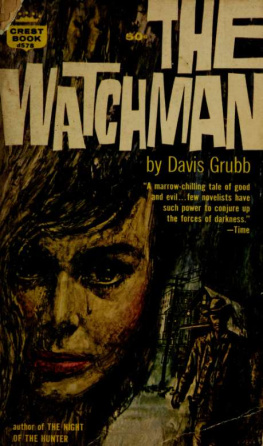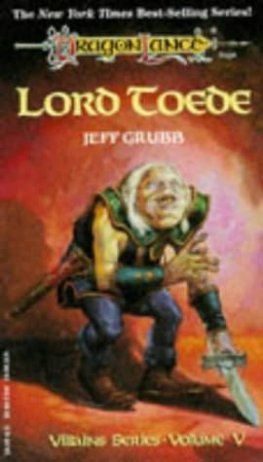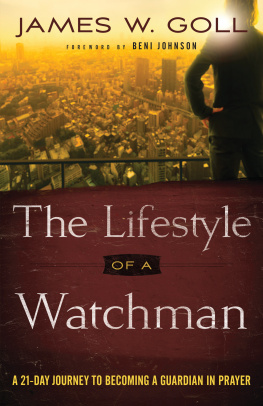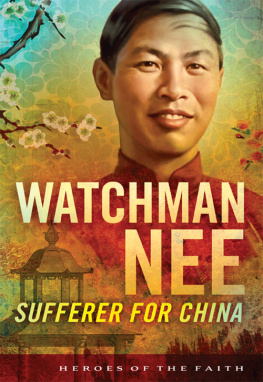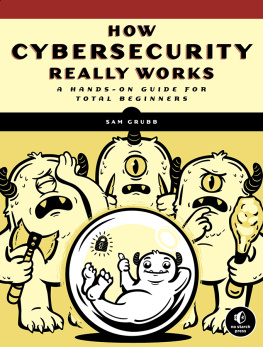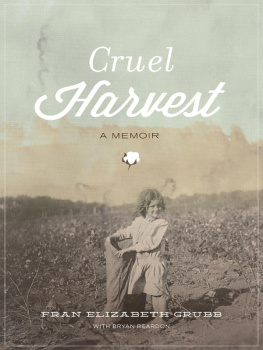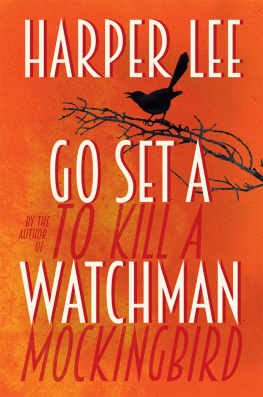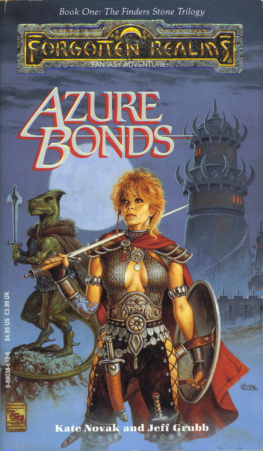Davis Grubb - The Watchman
Here you can read online Davis Grubb - The Watchman full text of the book (entire story) in english for free. Download pdf and epub, get meaning, cover and reviews about this ebook. year: 1962, publisher: Fawcett, genre: Adventure. Description of the work, (preface) as well as reviews are available. Best literature library LitArk.com created for fans of good reading and offers a wide selection of genres:
Romance novel
Science fiction
Adventure
Detective
Science
History
Home and family
Prose
Art
Politics
Computer
Non-fiction
Religion
Business
Children
Humor
Choose a favorite category and find really read worthwhile books. Enjoy immersion in the world of imagination, feel the emotions of the characters or learn something new for yourself, make an fascinating discovery.
- Book:The Watchman
- Author:
- Publisher:Fawcett
- Genre:
- Year:1962
- Rating:4 / 5
- Favourites:Add to favourites
- Your mark:
- 80
- 1
- 2
- 3
- 4
- 5
The Watchman: summary, description and annotation
We offer to read an annotation, description, summary or preface (depends on what the author of the book "The Watchman" wrote himself). If you haven't found the necessary information about the book — write in the comments, we will try to find it.
The Watchman — read online for free the complete book (whole text) full work
Below is the text of the book, divided by pages. System saving the place of the last page read, allows you to conveniently read the book "The Watchman" online for free, without having to search again every time where you left off. Put a bookmark, and you can go to the page where you finished reading at any time.
Font size:
Interval:
Bookmark:




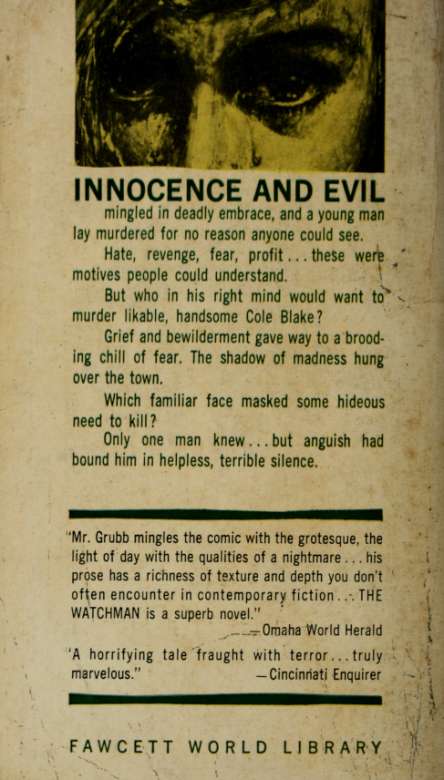
one
Stripped down to nothing but a suit of long under-wear and gray cotton socks the tough bulk of the big man on the Httle hotel bed seemed bigger than if it had been dressed. His legs stuck out between the brass bars of the bed's foot. His stuffed, tight shoulders extended far out over each side of the narrow, horsehair mattress. He had lain there nearly motionless for four hours. Now it was early eveningalmost time for the killing. The single window of the room was open but the blind was pulled to the sill. So that the air was cold. Yet, despite that, the leathery face of the big man was flushed with the fever of savage speculations: his forehead beaded and trickling with sweat. And each quarter-hour when the wall clock struck its announcement far down in the lobby of the country hotel the gray eyes of the big man glazed, his clenched mouth paled, and the big shape of him shuddered so that, for a moment, the sagging bedsprings sang and cried like a cage of rabid ferrets. Every article in the room had been rearranged to fresh placements of personal and astonishing eccentricity. Across the bureau mirror had been draped a threadbare bath towel upon which dimly could be read MOUND HOTEL. On the dresser top, beside the cracked leather of a broken, bulging Bible lay the big man's blue revolver. The keyhole of the hallway door, locked from the outside, was stuffed with newspaper. Yet, despite that precaution a heavy marble-topped washstand was jammed beneath the china knob. On the dusty rug beside the bed an ancient, broken table-radio hummed and crackled. Its sound filled the room with thin disturbance: a deranged and insect murmur. And yet that sound and the murmur through the open window of the small town night and the laughter of men's voices down in the lobby did not keep
Luther Alt from hearing the four soft knocks against the door. Yes, he thought, stiffening and closing his eyes a moment. Yes, time now, he thought. Time to get up and dress and strap on the gun and go: time for the kilHng. He opened his eyes, stiffened, then sprang out of bed, crossed the room, stood by the door in a half-crouch searching the walnut panels. He whispered a challenge of query, heard the muffled, unintelligible reply of a man's voice, waited, then heard presently again the light knocks. And thinking: It might be him. But then again it might not. It might be old Dobey sent up to rouse me. But then again it might be someone else.
Luther Alt swiftly crossed to the bureau, caught up the thirty-eight revolver, broke it open, saw its loaded chambers. He stood an instant staring at his big gun, somehow crippled now in his hand. Yes, he thought, it might be someone else. He inverted the gun, shook it hard, watched the five brass cartridges tumble out into the palm of his other hand. The man outside rapped more sharply now.
Directly! called Luther Alt and dropped the bullets into the pocket of his jacket on the chair by the washstand. He looked at the empty revolver with a grunt of relief, a notion of safety. Then he went to the door again, put his ear to the panel. He moved the washstand away from the knob and waited for the knock again.
Is that you, Dobey? he whispered, but the one beyond the oak did not hear him and rapped again, sharply now.
Who is it? cried Luther Alt.
It's me, Sheriff. It's the night clerk.
Who?
The night clerk! said the voice sharply at the crack of the door. Dobey the night clerk. You said for me to come and unlock you when it's time. Well it's come time.
Unlock the door, said Luther Alt wearily. He went back and fetched out the cartridges from his jacket, went to the dresser, broke open the revolver again, slowly loading it while he listened indifferently to the clatter and scratch of the night clerk's housekey, the opening of the door. The night clerk thrust his birdlike head inside for an instant to be certain Luther was awake and up. Luther listened, without turning.
You all right, Sheriff?
I'm all right, Dobey. Thank you, Dobey, said Luther, and listened to the whisper of the night clerk's carpet slip
pers fading away again down the hallway. He dressed swiftly now, strapping on the gunbelt, sliding his big shoulders into the jacket. For an instant before he left the room he hfted his head, murmuring something, raising his eyes slowly to the dim light of the room's ceiling globe: a frosted, mindless moon shedding the illumination of soiled twilight upon the squaUd room's sixty years of drummers' mercantile dreaming, the insomniac toss of transients drunk or half-mad with loneliness, the furtive and chronic embrace of lovers by the hour. The Sheriff's anguished eyes searched senselessly for that instant among the blurred, scattered pattern of dead moths and flies which calicoed the dull hght globe's interior: dried-up hieroglyphics of long-vanished simi-mer nights. Perhaps he imagined something was to be read there; maybe an answer to his torment. And for that moment his mouth murmuring softly, uninteUigibly, spoke to it or to himself or to the God beyond this spurious moon and thought to himself: How many more years? How many more towns? How long can a man keep running from it? Then he stiffened himself, passed through the open door, shut it behind him and moved down the hallway toward the stairway to the lobby, toward the men who sat there waiting to watch him pass, toward the street of the silent river night. And, of course, toward the killing.
On the water-green wall of the hotel lobby the hands of Peace the Undertaker's banjo clock stood at quarter past eight. The three men sat submerged in the couch and two chairs of bursted black leather and watched the river fog gather in the street beyond the long glass window. Dobey the night clerk fussed behind his front desk. The men had talked little in the hour since the woman had come slowly down the staircase and taken up her position on the straight-backed chair to the darkened dining-room door. They chewed and smoked and spat, listening to the growl of good dinners beneath their vests, watching the coming of the fog upon the long glass. An hour beforeUke this woman of the man who must dieit was not there. Since sundown the men had sat chatting in the lobby of the death that was to be done at nine. And then, hke the fog, the woman came.
It seemed to Mister Jibbons, the horse trader, that the woman was there to deprive them of something rightfully theirs; that she had come to spoil an occasion. And so it was from anger more than through any delicacy toward
the woman's feelings that he said the least of any, smoking and spitting and pondering the fog; avoiding the other men's eyes with the ritual diffidence of males in public toilets. The woman sat straight, hands folded upon her lap. Beneath her straight, streaked brown hair, knotted low on her neck, a hillwoman's face suggested that it had been pretty until the battering of long and humdrum mischances had convinced it that prettiness was not useful: a face that seemed not so much to have gone old as to have gone out, and one which somehow would have best grown ugly rather than having kept among its features of a faint, pinched prettiness the eroded traces of a girlishness long since become irrelevant. In that strained hour her gray eyes made their unending circuit: watch the backs of the men for a spell, then to the black telephone by the night clerk's gartered sleeve, then back to the hands of Peace the Undertaker's clock. Her gaze returned always to the neck of Jib-bons, the horse trader. In the deep crease of that fat nape between shaggy hairline and soiled collar Jibbons seemed to possess a second, lipless mouth. And it seemed to the woman in her racing fancies that this mouth might suddenly open and make a pronouncement of thunderclapping and unearthly reprieve. It was in the small curve of her own mouth that she showed how strongly she sensed her antagonists. But her eyes quietly declared that this place was where she belonged, this closest permissible place to her man on his night to die.
Font size:
Interval:
Bookmark:
Similar books «The Watchman»
Look at similar books to The Watchman. We have selected literature similar in name and meaning in the hope of providing readers with more options to find new, interesting, not yet read works.
Discussion, reviews of the book The Watchman and just readers' own opinions. Leave your comments, write what you think about the work, its meaning or the main characters. Specify what exactly you liked and what you didn't like, and why you think so.

